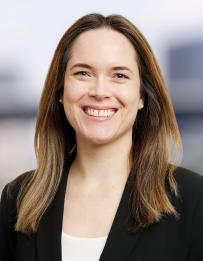Meet Alexandra (Ali) Salter-Blanc
Portland, Oregon, U.S.

Ali Salter-Blanc is a senior environmental scientist specializing in environmental investigation and cleanup of as per- and polyfluoroalkyl substances (PFAS) and emerging contaminants.
With 15 years of applied research and environmental consulting experience, Ali is passionate about developing practical solutions to complex challenges.
Working in emerging contaminants has never been more important than now, when public and media attention is increasingly shifting towards the impact of chemicals such as PFAS. This makes Ali’s role central to current and future solutions to remediate PFAS-contaminated sites and to plan PFAS removal from products to avoid this contamination.
“I’ve enjoyed science from the time I was a kid watching NOVA (an American popular science program) on public television. Along the way, I realized that I was most passionate about applying science to tangible problems.”
Get to know Ali
-
100 +
PFAS release sites characterized
-
200 +
native plants planted
-
50 +
daughters' soccer games attended
Tell us a bit about your background.
I’ve enjoyed science from the time I was a kid watching NOVA (an American popular science program) on public television. This led me to a bachelor’s degree in chemistry and PhD in environmental science and engineering. Along the way, I realized that I was most passionate about applying science to tangible problems. I was drawn to the environmental industry because of the opportunity to apply my technical background to addressing contamination impacting people and the environment.
What do you do in your current role?
I currently co-lead our global Emerging Contaminants Community of Practice of 900+ staff and support projects as a PFAS subject matter expert. I’ve served as a technical lead for PFAS investigations and response actions at over 100 sites at federal and private client facilities. My work focuses on identifying and delivering solutions to address challenges posed by emerging contaminants such as PFAS in the environment.
What are the current challenges in managing PFAS?
Addressing PFAS can be challenging because PFAS are prevalent in the environment, many of them do not degrade under natural conditions and health concerns surrounding certain PFAS are leading to increasingly stringent regulations to limit their release and address exposure risks. I work with clients to develop cost-effective and regulatory-compliant PFAS management strategies, from preventing PFAS releases in the first place to investigating and remediating environmental releases.
How does Jacobs support our clients through the entire PFAS project lifecycle?
From an environmental investigation and remediation perspective, we offer a full range of services, from identifying and investigating PFAS release sites, assessing risks to human health and ecological receptors, developing sustainable remediation solutions and managing PFAS-impacted waste. We also support our clients in avoiding PFAS releases in the first place. This includes engineering the changeout and cleanout of aqueous film forming foam (AFFF) fire suppression systems and providing expert advice in implementing best management practices necessary to achieve industrial effluent limits.
We have a broad range of specialists, including environmental and water treatment professionals, risk assessors, fire protection engineers, permitting experts, waste management specialists and others with PFAS expertise who come together to provide cross-cutting solutions.
What advice would you give to young professionals interested in a similar career?
My advice is to stay curious and ask questions. One of the things I enjoy about environmental consulting is that I learn something new every day. There’s always something to learn or a new challenge to tackle, which keeps the job exciting. Also, because our industry is in the early phases of identifying and addressing PFAS impacts, it’s also an opportunity to be part of pioneering approaches.
When not working, what do you enjoy doing?
Outside of work, I enjoy spending time with my husband and two daughters, getting together with extended family and friends, spending time outdoors, reading and gardening. Over the past few years, I’ve been working on introducing more native plants to my yard to create a relaxing, low-maintenance space that’s also climate-friendly and beneficial to local wildlife.












































